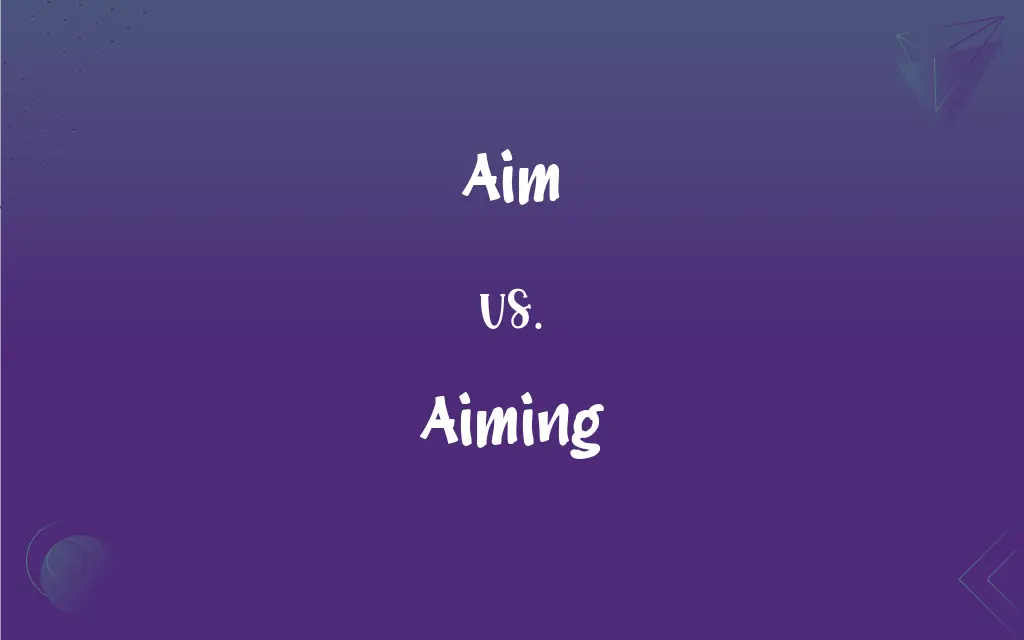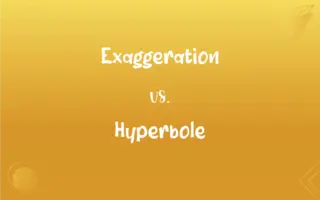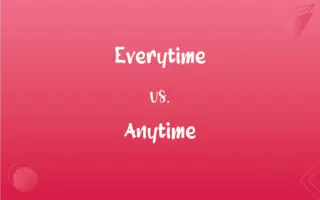Aim vs. Aiming: What's the Difference?
By Janet White || Updated on November 28, 2023
Aim is a noun or verb referring to a goal or the act of directing something at a target; aiming is the present participle of the verb, emphasizing the action of targeting.

Key Differences
Aim often functions as a noun, representing a goal or objective, such as in the sentence, "His aim is to become a doctor." In contrast, aiming is used as a verb form, specifically the present participle, indicating the action of directing something towards a target, as in "She is aiming for the bullseye."
As a verb, aim implies the action of directing something, typically a weapon or a remark, towards a particular point or target, exemplified by "He aims the arrow at the target." Aiming, on the other hand, conveys a sense of ongoing action or effort, as seen in "She is aiming to improve her skills."
Aim can also signify intention or purpose, for example, "His aim was to secure a scholarship." Aiming suggests the process or act of trying to achieve something, illustrated in "They are aiming to set a new record."
In figurative usage, aim represents an aspiration or desired outcome, such as "Her aim in life is to help others." Meanwhile, aiming implies the process of striving or working towards such aspirations, like "He is aiming at becoming a renowned artist."
Aim in its verb form can imply a single act or decision, as in "Aim carefully before you shoot." In contrast, aiming often suggests a more prolonged or ongoing effort, as in "She is aiming to become a better writer over time."
ADVERTISEMENT
Comparison Chart
Form
Noun/Verb
Verb (Present Participle)
Usage
Represents a goal/objective or the act of directing
Indicates ongoing action or effort
Context
Often about intentions or purposes
More about the process or act of trying
Temporality
Can imply a single act or decision
Suggests a prolonged or ongoing effort
Example
"His aim is accuracy."
"She is aiming for accuracy."
ADVERTISEMENT
Aim and Aiming Definitions
Aim
Directing something at a target.
Aim the camera at the bird.
Aiming
Striving for a goal.
He is aiming to win the championship.
Aim
Goal/Objective.
His aim was to win the race.
Aiming
Directing towards a target.
She is aiming the telescope at the stars.
Aim
Point or direction.
The compass aim points north.
Aiming
Focusing effort or attention.
She is aiming for perfection in her work.
Aim
Aspiration.
His aim in life is to travel the world.
Aiming
Targeting in planning or discussion.
They are aiming at a new marketing strategy.
Aim
Intention or purpose.
Her aim is to become a lawyer.
Aiming
Seeking to achieve.
They are aiming to increase their sales.
Aim
To direct (a weapon or camera) toward a point.
Aiming
To direct (a weapon or camera) toward a point.
Aim
To direct or propel (an object, such as a ball) toward a point
Aimed the pass at a wide receiver.
Aimed the shot at the lower right corner of the goal.
Aiming
To direct or propel (an object, such as a ball) toward a point
Aimed the pass at a wide receiver.
Aimed the shot at the lower right corner of the goal.
Aim
To direct toward or intend for a particular goal or group
The publicity campaign was aimed at improving the eating habits of children.
Aiming
To direct toward or intend for a particular goal or group
The publicity campaign was aimed at improving the eating habits of children.
FAQs
Can 'aim' be used as a verb?
Yes, 'aim' can be used as a verb to mean directing towards a target.
Does 'aiming' suggest a process?
Yes, 'aiming' suggests the process of trying to achieve something.
What is the noun form of 'aim'?
Aim as a noun refers to a goal or objective.
Does 'aiming' always involve physical targets?
No, 'aiming' can refer to goals or objectives, not just physical targets.
Can 'aim' be a point or direction?
Yes, 'aim' can also mean a point or direction one is targeting.
Can 'aim' indicate a single act?
Yes, 'aim' can imply a single act, especially in the verb form.
Is 'aiming' a continuous action?
Yes, 'aiming' indicates an ongoing or continuous action.
Can 'aim' imply intention?
Yes, 'aim' can signify an intention or purpose.
Can 'aim' be synonymous with 'goal'?
In some contexts, 'aim' can be synonymous with 'goal'.
Is 'aim' used in professional settings?
Yes, 'aim' is commonly used in professional and business contexts.
Can 'aim' be used in sports?
Yes, 'aim' is commonly used in sports, especially in precision sports.
Does 'aim' always involve precision?
Often, but not exclusively, 'aim' involves precision.
Is 'aiming' used in strategic contexts?
Yes, 'aiming' is often used in strategic or planning contexts.
Is 'aiming' used figuratively?
Yes, 'aiming' can be used in a figurative sense.
Does 'aiming' imply effort?
Yes, 'aiming' implies effort or striving towards something.
Does 'aiming' require physical action?
Not always, 'aiming' can be metaphorical or strategic.
Can 'aiming' indicate future aspirations?
Yes, 'aiming' can be about future goals or aspirations.
Is 'aiming' a temporary or prolonged action?
'Aiming' often suggests a prolonged or ongoing effort.
Can 'aim' be an aspiration?
Yes, 'aim' can represent an aspiration or desired outcome.
Is 'aiming' used in educational contexts?
Yes, 'aiming' can be used to describe goals or objectives in education.
About Author
Written by
Janet WhiteJanet White has been an esteemed writer and blogger for Difference Wiki. Holding a Master's degree in Science and Medical Journalism from the prestigious Boston University, she has consistently demonstrated her expertise and passion for her field. When she's not immersed in her work, Janet relishes her time exercising, delving into a good book, and cherishing moments with friends and family.































































